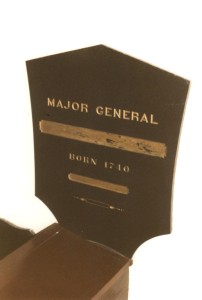When Pride Becomes Your Own Worst Enemy

 It stings to be overlooked—especially when you’re good at what you do.
It stings to be overlooked—especially when you’re good at what you do.
Benedict Arnold’s name is synonymous with treason. He was the American Revolution’s Judas. When we were kids and someone was a traitor to a friendship, we called him Benedict Arnold.
That’s too bad, too, because Arnold was perhaps the best general America had during the war. He could organize men. He was good at strategy. He was fearless. His march on Quebec, his capture of Fort Ticonderoga, and his planning for the Battle of Saratoga today remain textbook cases of great military leadership.
Benedict Arnold was a good leader, and he knew it. And that’s where the problem came in.
Arnold had an ego. He was impetuous. He was often called out for insubordination, even when those acts of insubordination turned the tide of the battle in the continental army’s favor. So on February 19, 1777, the Continental Congress promoted five men to major general, but Arnold was not one of them. Congress knew Arnold was a good leader, but they rightfully looked to military men who could also be team players. Benedict Arnold was good, but he was in it for himself.
Benedict Arnold had a pity party. Five men who had been his juniors were now promoted over him. Arnold felt unappreciated.

The British also knew Arnold was a great leader—they had felt the brunt of his strategic attacks—and they were willing to overlook the less-than-stellar acts on his resume. So Britain gained a new leader, and American gained its first traitor.
All because of pride.
Has anything positive ever come out of someone’s pride?
I know you’re good at something. Everybody has at least one area where they excel. And it’s OK to know you’re good at it. Really. We don’t need any fake humility. The difference between a person like Benedict Arnold and what God desires in us is this: We know we’re good at something, but we don’t make a big deal of it.
“For by the grace given to me, I tell everyone among you not to think of himself more highly than he should think. Instead, think sensibly, as God has distributed a measure of faith to each one” (Rom. 12:3).
You don’t have to tell others what you’re good at. They know. Pride dismisses the achievements of others, but humility lets us see the good and value that others bring to the table. Pride also prevents us from seeing ourselves as God sees us.
Who knows, perhaps the Revolutionary War would’ve ended sooner with less casualties had Benedict Arnold humbled himself and stayed with the patriots. He certainly wouldn’t have been disdained and misaligned for 240+ years. And he would likely not have died destitute in London.
“God resists the proud but gives grace to the humble” (Jas. 4:6).
Subscribe to this blog at the top of the page! And encourage others by sharing this post.
For a printable version: click here.
This post supports the study “Set Apart in the Way We Think” in Bible Studies for Life and YOU.
Podcast
Join Lynn Pryor and Chris Johnson as they discuss this topic:






